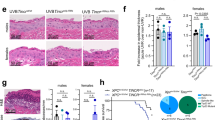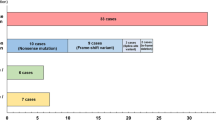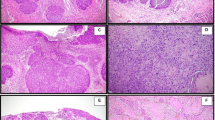Abstract
Using immunocytochemical and Western blotting techniques we have demonstrated the presence of abnormally high levels of p53 protein in 8/24 (33%) of human squamous cell carcinomas (SCC) and 9/18 (50%) of SCC cell lines. There was a correlation between the immunocytochemical results obtained with eight SCC samples and their corresponding cell lines. Direct sequencing of PCR-amplified, reverse transcribed, p53 mRNA confirmed the expression of point mutations in six of the positive cell lines and detected in-frame deletions in two others. We also detected two stop mutations and three out-of-frame deletions in five lines which did not express elevated levels of p53 protein. Several of the mutations found in SCC of the tongue (3/7) were in a region (codons 144-166) previously identified as being a p53 mutational hot spot in non-small cell lung tumours (Mitsudomi et al., 1992). In 11/13 cases only the mutant alleles were expressed suggesting loss or reduced expression of the wild type alleles in these cases. Six of the mutations were also detected in the SCCs from which the lines were derived, strongly suggesting that the mutations occurred, and were selected, in vivo. The 12th mutation GTG-->GGG (valine-->glycine) at codon 216 was expressed in line SCC-12 clone B along with an apparently normal p53 allele and is to our knowledge a novel mutation. Line BICR-19 also expressed a normal p53 allele in addition to one where exon 10 was deleted. Additionally 15 of the SCC lines (including all of those which did not show elevated p53 protein levels) were screened for the presence of human papillomavirus types 16 and 18 and were found to be negative. These results are discussed in relation to the pathogenesis of SCC and the immortalisation of human keratinocytes in vitro.
This is a preview of subscription content, access via your institution
Access options
Subscribe to this journal
Receive 24 print issues and online access
$259.00 per year
only $10.79 per issue
Buy this article
- Purchase on Springer Link
- Instant access to full article PDF
Prices may be subject to local taxes which are calculated during checkout
Similar content being viewed by others
Author information
Authors and Affiliations
Rights and permissions
About this article
Cite this article
Burns, J., Baird, M., Clark, L. et al. Gene mutations and increased levels of p53 protein in human squamous cell carcinomas and their cell lines. Br J Cancer 67, 1274–1284 (1993). https://doi.org/10.1038/bjc.1993.238
Issue Date:
DOI: https://doi.org/10.1038/bjc.1993.238
This article is cited by
-
Establishment and characterization of a novel hypopharyngeal squamous cell carcinoma cell line CZH1 with genetic abnormalities
Human Cell (2024)
-
Loss of p53 activates thyroid hormone via type 2 deiodinase and enhances DNA damage
Nature Communications (2023)
-
ACTL6A suppresses p21Cip1 expression to enhance the epidermal squamous cell carcinoma phenotype
Oncogene (2020)
-
Stage-dependent therapeutic efficacy in PI3K/mTOR-driven squamous cell carcinoma of the skin
Cell Death & Differentiation (2018)
-
Inefficient differentiation response to cell cycle stress leads to genomic instability and malignant progression of squamous carcinoma cells
Cell Death & Disease (2017)



